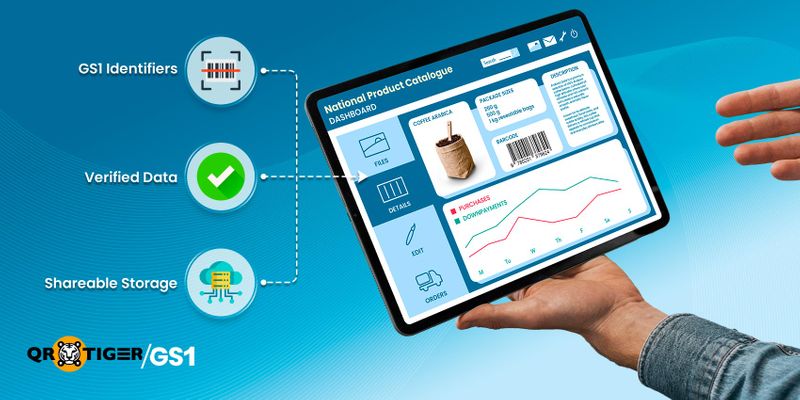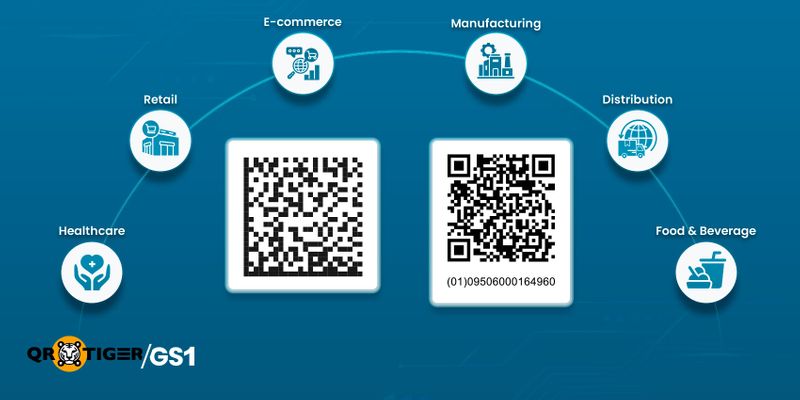GS1 Saudi Arabia: Powering Smart Industry Standards

Industries need smart, standardized systems to manage product data, ensure traceability, and optimize global trade. From retail shelves to hospital supply chains, smooth data exchange and accurate identification are no longer optional but essential.
GS1 Saudi Arabia (SA) plays an essential role in this transformation by offering globally recognized standards that help businesses across the Kingdom operate with greater efficiency and transparency. Its services and tools help businesses simplify operations, reduce errors, and build consumer confidence.
This blog explores how GS1 SA helps businesses adopt industry standards and drive smarter supply chains.
Table of Contents
What is GS1 Saudi Arabia?
GS1 Saudi Arabia is the official sole authorized entity responsible for promoting and guiding the adoption of GS1 standards. across industries operating in the Kingdom. It is a part of the global GS1 network that helps businesses uniquely identify locations, products, and logistics units through its internationally recognized identification systems.
Operating under the name مركز الترقيم السعودي (Saudi Numbering Center), GS1 SA provides a suite of services tailored to the needs of sectors like retail, logistics, healthcare, and technical industries.
The member organization(MO) works in association with the Council of Saudi Chambers of Commerce (CSC) to ensure that GS1 services are aligned with national economic goals and accessible to companies of all sizes through chamber networks. By promoting standardized data practices, GS1 SA supports Saudi businesses meeting local and international compliance requirements.
Contact information
Address: King Fahad Branch Rd, Al Mutamarat, Riyadh 12711, Saudi Arabia
Contact no: + 966 11 218 24 21 / +966 11 218 21 81 / +966 11 218 23 74
Email: gs1sa@gs1.org.sa
Introduced initiatives and collaborated campaigns
GS1 SA collaborates with industry partners to simplify the adoption of global standards that support digital innovation.
Strengthening import compliance with GTINs
To improve safety and product traceability in the supply chain, GS1 SA has partnered with the Saudi Standards, Metrology and Quality Organization (SASO) to enforce a key regulation for importers.
From January 1, 2020, all local importers bringing foreign products into Saudi Arabia must submit product details, including valid Global Trade Item Numbers (GTINs) issued by GS1 MO through the centralized SABER portal.
This initiative ensures that imported goods meet global identification standards, helping optimize customs processes and enhance consumer protection.
Expanding global reach through e-commerce collaboration
GS1 SA partnered with the Saudi Export Development Authority to support the E-Promotion project, a national initiative that aims to help Saudi exporters showcase their products on global e-commerce platforms. This collaboration aligns with Saudi Vision 2030 goals to boost non-oil exports and expand the global reach.
By promoting standardized product identification and digital traceability, GS1 SA plays a vital role in enabling Saudi manufacturers to meet international trade requirements. Their involvement helps ensure that products listed online are accurately identified and easily searchable, allowing global buyers to easily connect with reliable Saudi suppliers.
Advancing drug safety through SFDA collaboration
GS1 SA partnered with the Saudi Food and Drug Authority (SFDA) to support a national system for drug traceability. This initiative ensures that all pharmaceutical products, both human and veterinary, are labeled with standardized GS1 DataMatrix barcodes containing key details like batch number, GTIN, and expiration date.
The collaboration helps improve product safety from manufacturer to patient, aligning the country with global standards for supply chain transparency.
Driving regional collaboration and global standards
GS1 SA, locally known as the Saudi Barcode Center, under the Federation of Saudi Chambers, plays a key role in advancing global coding standards within the Kingdom. During the GS1 MEMA Regional Forum held in Riyadh in November 2023, the member organization demonstrated its commitment to improving product safety, traceability, and international trade alignment.
The local GS1 body brings together industry leaders, regional coding centers, and experts to discuss innovations in classification systems, digital information platforms, and customs integration. With support from the SASO, GS1 SA contributes to initiatives like product safety tracking and the transition to next-generation barcodes.
GS1 SA services for businesses
Here are different services by GS1 that modernize business practices.
Enhanced product identification with GS1 KSA mobile app
The GS1 Saudi Arabia (GS1 KSA) mobile app is designed to simplify and improve business operations across the Kingdom. It provides access to GS1 standards for product identification, barcode generation, and data sharing. These tools help improve supply chain accuracy and regulatory compliance.
Businesses can use the app to register products, verify barcodes, and ensure traceability throughout the distribution process.
By integrating global GS1 standards with local needs, this app enables companies to boost transparency and efficiency in the marketplace. It provides a trusted digital solution that helps manufacturers, retailers, and logistics providers optimize inventory tracking and enhance trade efficiency.
Globally standardized codes for product identification
The member organization provides globally standardized codes helping businesses uniquely identify products, locations, and logistics units. These include the GTIN (for product identification), GLN (Global Location Number) (for identifying business locations), and SSCC (Serial Shipping Container Code) (for tracking shipments).
These identifiers help ensure product authenticity, improve inventory management, and enable efficient data exchange across supply chains.
By using these codes, businesses in Saudi Arabia can adhere to international trade requirements, enhance visibility across sectors, and reduce errors in logistics. These identifiers also support e-commerce platforms and customs authorities by simplifying product classification and verification processes.
In addition to product-level identification, the local GS1 body supports specialized codes like GRAI (Global Returnable Asset Identifier) and GIAI (Global Individual Asset Identifier) for asset tracking, and GSIN (Global Shipment Identification Number) and GINC for shipment identification.
Verified by GS1
This service confirms the validity of GS1 identifiers. Users can access a trusted international database known as the GS1 Registry Platform to check whether a product’s barcode and identification numbers are structured according to GS1 standards and officially issued by a GS1 member organization.
This service improves supply chain transparency and trust by answering key verification questions, such as whether a number is licensed to a specific company and whether the registered data aligns with internal records.
Traceability solution
It strengthens supply chain transparency by allowing businesses to track and trace products across every stage (from origin to consumer). The services use globally standardized GS1 identifiers like GTIN, GLN, and SSCC, to make sure each product’s transition happens precisely. This allows stakeholders to access real-time data regarding product location, status, and history.
It verifies product authenticity and safety to build consumer trust. It empowers organizations to reduce counterfeiting, respond swiftly to recalls, optimize logistics, and align with international best practices.
National Product Catalogue (NPC)

This centralized platform allows companies to share and handle product data in a standardized and trusted format. It uses global data standards and GS1 identifiers. NPC makes sure the product information (such as dimensions, descriptions, and classifications) is up-to-date, accurate, and easily accessible to all stakeholders and government entities.
It improves data quality, decreases manual data exchange, and supports regulatory compliance across industries. Promoting transparency and making supply chains more efficient, it enables retailers, suppliers, and distributors to easily collaborate.
With NPC, businesses can confidently present their products across digital platforms and boost e-commerce readiness.
Applications of 2D barcodes across industries in SA
GS1 Digital Link is transforming traditional barcodes into smart gateways that connect physical products to rich digital content. By encoding GS1 identifiers like GTIN, GLN, or SSCC into a URL format, it enables instant access to traceability data, specifications, marketing details, and regulatory information, all through a single scan from a smartphone or compatible device.
This innovation aligns with smart technologies and the Internet of Things (IoT) to support smarter, more connected supply chains. As part of this evolution, GS1 Sunrise 2027 is accelerating the shift from traditional 1D barcodes to smarter, data-rich 2D barcodes such as GS1 QR code and DataMatrix.
These compact codes can carry more details than just a product ID. They can encode batch numbers, expiry dates, and even direct links to digital content. Retailers across Saudi Arabia and beyond are already upgrading their scanners to read both formats, preparing the path for smooth adoption.
For now, businesses can continue using 1D barcodes without disruption, unless specific industry or regulatory mandates require otherwise. But as 2027 approaches, companies should prepare to adopt 2D barcodes as the new standard.
Brand owners may choose to display both 1D and 2D codes on packaging, or transition fully to 2D once systems are ready. To stay ahead, businesses should start integrating GS1 Digital URI and updating their data systems to support richer, more interactive product information.
As businesses prepare for the shift to 2D barcodes under the Sunrise 2027 initiative, one of the first strategic choices they face is whether to generate these codes internally or use external expertise.
Companies with robust IT infrastructure and skilled teams can create GS1-compliant 2D barcodes by following official implementation guidelines provided by GS1. These guidelines ensure that the codes are globally interoperable, correctly structured, and ready for retail and regulatory use.
For businesses that may not have the technical resources or prefer a faster deployment, partnering with a reliable third-party provider like QR Tiger’s GS1 QR code generator is recommended.
Here are some of the key applications of these codes across industries in SA:

Retail and e-commerce
2D barcodes are transforming how products are identified, tracked, and marketed. They can encode far more information than traditional linear barcodes. For example, consumers can scan a GS1 Digital Link QR code to instantly access verified details, user manuals, or sustainability credentials. E-commerce platforms benefit from 2D barcodes by connecting physical products to digital content.
Retailers use them to optimize inventory management, enhance point-of-sale efficiency, and facilitate dynamic pricing and loyalty programs. This improves transparency and consumer trust, while supporting Saudi Vision 2030 goals for digital transformation and smart commerce.
Logistics and supply chain
2D barcodes are used in logistics to identify and track shipping containers, pallets, and individual packages. GS1 SA supports the use of SSCC encoded in 2D formats to boost visibility across the supply chain. These codes facilitate effective tracking, reduce manual errors, and optimize warehouse operations.
A GS1 global standard Scan4Transport allows logistics and transport providers to incorporate shipment info such as destination address, hazardous goods alerts, and special handling instructions into a 2D barcode printed on the logistics label.
This smart label simplifies scanning and boosts visibility across the supply chain.
Food and beverage
The food industry uses 2D barcodes to improve product traceability, safety, and consumer engagement. The details, such as batch numbers, production dates, and allergen information, are integrated into these codes to help manufacturers and retailers comply with food safety regulations.
The codes support faster recalls and better expiry tracking. Consumers can scan a 2D barcode to stay informed of sourcing details or nutritional facts. This aligns with growing demand for transparency and ethical sourcing. GS1 SA’s traceability solutions, powered by 2D barcodes, help food businesses build trust and meet both local and international standards.
Healthcare and pharmaceuticals
In healthcare, GS1 DataMatrix, is explicitly accepted/required for Unique Device Identification (UDI) and pharmaceutical traceability. Pharmacies and hospitals use these codes to precisely track medical devices, prescriptions, and patient safety data.
They encode lot numbers, serial numbers, and expiry dates to reduce medication errors and support regulatory compliance. SFDA’s Track-and-Trace system requires 2D barcodes on drug packaging to ensure traceability and combat counterfeiting.
GS1 standards enable healthcare providers to scan and verify products at every stage, from manufacturer to patient. This enhances inventory accuracy and patient safety and supports recall management.
Advancing Saudi Industry Through Global Standards
GS1 Saudi Arabia supports digital transformation by delivering globally recognized standards that improve product identification, traceability, and data sharing across industries. Its services empower Saudi businesses across industries to operate with greater efficiency, transparency, and regulatory alignment.
Through strategic collaborations and initiatives, the member organization fosters a future-ready ecosystem that supports Vision 2030’s goals for smart industry growth. By joining GS1, businesses can connect to a global network of industry standards and thrive in a digital, data-driven marketplace.
Frequently asked questions
1. Does GS1 support traceability?
Yes, GS1 offers a Traceability Solution that uses GS1 identifiers to track products from origin to consumer. It facilitates real-time visibility, supports recall management, and ensures compliance with safety regulations. This solution is chiefly valuable in sectors like logistics, food, and healthcare.
2. How can a company register with GS1 SA?
Ensure the company operates in, or has a registered presence within, the Saudi market.
- Visit the official Member Registration portal and fill out an application form.
- Submit essential documentation such as an identification document, proof of address, and business registration proof.
- Identify the number of barcodes required as per the business’s operational needs.
- Once the application is reviewed and approved, GS1 SA issues a GS1 Company Prefix allowing the company to generate globally recognized identifiers like GTINs and barcodes.
- After registration, members can access GS1 tools and services.
3. Does GS1 provide training to companies new to GS1 standards?
Yes, GS1 Member Organizations provide training sessions, technical support, and user guides to help companies understand and implement GS1 standards. These resources typically cover barcode generation, product identification, data sharing, and traceability practices. To support local businesses, each GS1 MO offers these materials in the relevant languages of its market.
DISCLAIMER: We acknowledge that GS1, as well as the materials, proprietary items, and all related patents, copyright, trademark, and other intellectual property (collectively, “intellectual property”) relating to its use, are the property of GS1 Global, and that our use of the same shall be in accordance with the conditions provided by GS1 Global.




